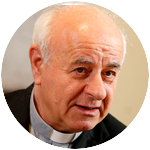
Archbishop Vincenzo Paglia
Nowadays, the church cannot be a mere guardian of ideas and beliefs, however good and righteous that may be. The mystery of life, that is, the way God dwells in history, must not only be safeguarded and protected, but also pragmatically proclaimed as much as possible, because men and women on this planet need to perceive the salvific presence of the Spirit in their lives. This change of approach is extremely relevant today.
First, as Pope Francis often says, the church and all of us, the community of believers, must be out and about, not shut up inside, to proclaim our Christian values and principles in everyday life. We must bring Christianity back to the streets, where its lifeblood is much needed. A profound rethinking of the questions that are crucial for humanity implicitly needs everyone’s help.
Let us consider, for instance, the members of the Pontifical Academy for Life: Among them there are Catholics of course but also Orthodox, Protestants, Muslims, Jews, Taoists, even nonbelievers. This results in an overall impression of enriching diversity because differences are genuine portals of discovery and regeneration. Arid are those who regard differences only as problematic and divisive aspects.
The academy is meant to be a place for dialogue, where science and contemporary cultures are combined with religion and ethics to render a service to humanity.
[hotblock]
In the academy, we are convinced that we will have to face a perspective that in a synthetic way can be called bio-politics. In the face of a new condition of globalized humanity, political forces at all levels must be careful to rethink and redesign the role of politics itself. We must avoid a rich Global North that does not take into account the large number of poor countries. We must prevent discrimination within the same country.
The pandemic we are experiencing makes us understand the need to rethink and reorganize health care, treatments, technologies, public health in a more shared and more equal way. The academy is putting a great deal of thought into it. It is also committed to preventing the so-called “surveillance society” from prevailing, where technology owners could become the absolute masters of citizens’ lives.
As you can see, the number of topics to be addressed is increasing, but they are all directed toward the perspective of the unity of the human family that dwells in the only habitable planet we have, and it must be so for this generation, for the next one and for those to come.
In my vision, our academy is similar to the talents of the Gospel parable: The pope gave them to us expecting us to realize a profit, to make them grow, just as the wise servant did. That’s the reason why we must “live” in contemporary cultures, to discuss and be confronted with them, to take part in the scientific and academic debates.
We must not be like that fearful, lazy, indifferent servant who buries his talent in the ground. That would be a big mistake. I am not referring only to the gifts entrusted to each of us. Here I mean that unique gift that is our academy, a family of scholars and researchers, passionate and giving professionals, including religious and nonbelievers.
Our common goal is to invest our lives to protect, defend and promote the gift of life. That is the academy’s mission.
***
Archbishop Vincenzo Paglia is president of the Pontifical Academy for Life.
PREVIOUS: My fellow Catholics: Let our faith drive our politics, not the other way around
NEXT: History’s greatest inaugural speeches


Share this story